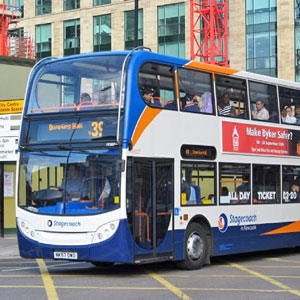Stagecoach fits greener engines to prolong vehicle life
- Like
- Digg
- Del
- Tumblr
- VKontakte
- Buffer
- Love This
- Odnoklassniki
- Meneame
- Blogger
- Amazon
- Yahoo Mail
- Gmail
- AOL
- Newsvine
- HackerNews
- Evernote
- MySpace
- Mail.ru
- Viadeo
- Line
- Comments
- Yummly
- SMS
- Viber
- Telegram
- Subscribe
- Skype
- Facebook Messenger
- Kakao
- LiveJournal
- Yammer
- Edgar
- Fintel
- Mix
- Instapaper
- Copy Link
Posted: 24 May 2011 | Stagecoach | 1 comment
Stagecoach is to fit new, greener engines in some of its mid-life buses to reduce emissions and lower the company’s carbon footprint…


ADL Trident double deck Stagecoach bus
Transport group Stagecoach is to fit new, greener engines in some of its mid-life buses to reduce emissions and lower the company’s carbon footprint.
The Perth-based company will spend around £500,000 over the next 12 months re-powering around 50 ADL Trident double deck vehicles with more efficient engines.
The new Euro 5- engines will replace the vehicles’ current Euro 3 engines, reducing fuel consumption by up to 25% and lowering carbon emissions as well as prolonging the life of the vehicles and providing greater reliability for passengers.
The announcement came during Stagecoach Green Week – an annual week-long programme of events designed to raise awareness of green issues and to promote the environmental, and financial, benefits of using public transport.
Managing Director of Stagecoach UK Bus, Les Warneford said: “Many of the vehicles are around 8-10 years old and are in good condition but require new engines. It makes sense to fit newer greener engines to prolong their life.
“We are working hard to minimise the impact of our operations on the environment. We believe that by continuing to invest in new technology and greener measures, as well as encouraging a more bus-friendly approach in towns and cities, we can attract even more people on to our greener, smarter bus services.”
The engine re-power project is the latest in a string of measures being taken by Stagecoach to reduce its carbon footprint as a business.
The Group has launched a sustainability strategy and is investing £11million in a range of measures to meet its environmental targets. The Group is targeting an overall reduction of 8% in buildings CO2 emissions and a cut of 3% in annual fleet transport CO2e emissions by 2014. It follows a reduction in the carbon intensity of its UK businesses of 5.7% in the three years to 30 April 2009.
It is estimated the five-year programme, from 2009-10 to 2013-14, will save a total of nearly 150,000 tonnes of CO2e, with the Group’s annual emissions reduced by around 40,000 tonnes CO2e by April 2014.
Last year, Stagecoach Group was awarded the prestigious Carbon Trust Standard after taking action on climate change by measuring and reducing its carbon emissions. Stagecoach is the first Scottish-based transport group – and one of only two listed UK public transport operators – to have achieved the stretching carbon reduction benchmark. It covers all of the Group’s bus and rail operations in the UK.
Stagecoach is leading the way on investing in greener vehicles and has placed orders for 142 hybrid electric buses in the past year which deliver a 30% reduction in carbon emissions compared to standard vehicles. Hybrid electric vehicles are already in operation in Oxford and Manchester and more will be introduced across the UK within the next 12 months.
The company also recently announced a multi-million-pound investment in a hi-tech eco-driving system, by Green Road, which is expected to reduce fuel consumption at its bus division by 4%. The scheme also offers employees the chance to earn “green points” that are converted into financial benefits from a potential £900,000 annual bonus pot.
Stagecoach is also installing a new ‘intelligent’ lighting system – which uses movement sensors to determine the amount of light required – at six bus depots across the UK. Based on previous trials, it is expected that the system could reduce the energy consumption used on lighting at the six depots by around 40% as a result of the ‘intelligent’ nature of the technology. This would produce an annual saving of more than 373,000kilowatts per hour (KWh) and save almost 230 tonnes of CO2 over the course of a year.
For further information about Stagecoach bus services, visit www.stagecoachbus.com




Thanks for writing this awesome article. I’m a long time reader but I’ve never been compelled to leave
a comment. I subscribed to your blog and shared this on my Facebook.
Thanks again for a great article!